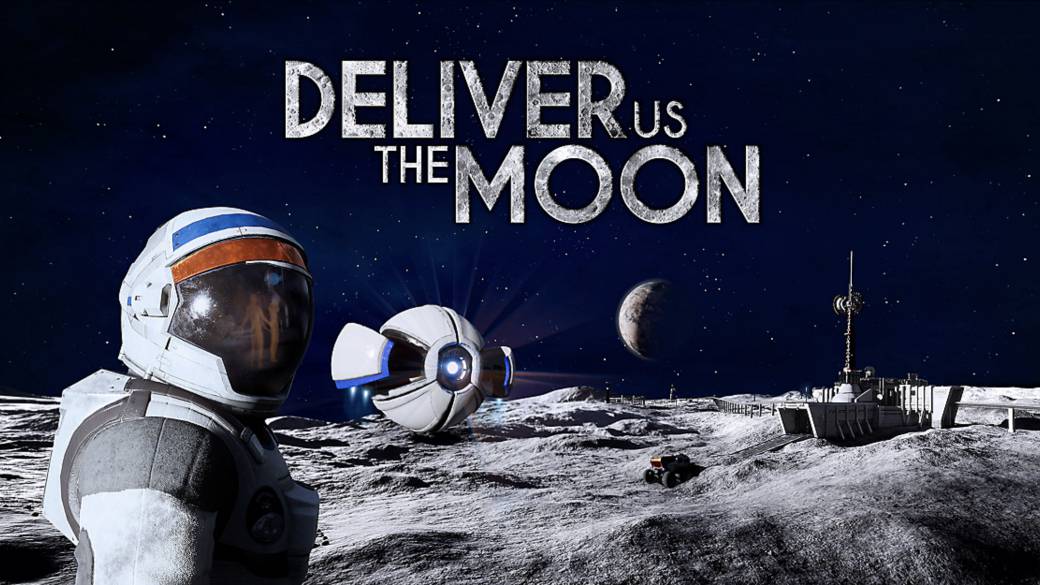
We set sail for the Moon on a playable upgradeable, but narratively captivating journey.
"We are the means for the Cosmos to know itself", Carl Sagan
Many times we have spoken of the 'imperfect games', titles with deficiencies in one or more of its sections, which, however, later constitute experiences that leave us with more depth than a more 'perfect' work, with more quality in its sections – based on the concept that intrinsic perfection does NOT exist. They are games that for this or that reason will not have a brilliant score, that if you look at their parts with a magnifying glass you will detect faults, but that make up an emotional adventure that can hook you. Deliver us the Moon is one of them.
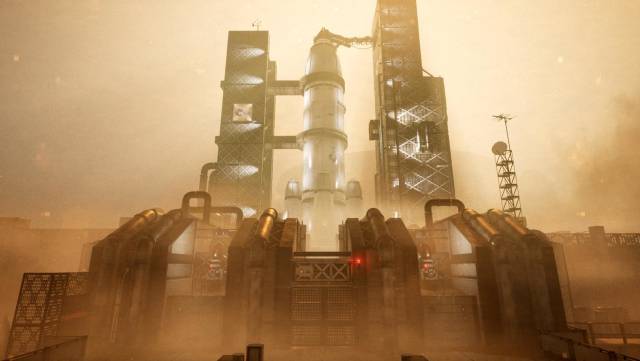
Save the world
The year is 2030, the Earth experiences a huge global energy crisis. The world begins to lose its oceans, which become deserts; sand storms are a constant. The planet is doomed to extinction, but a group of scientists accomplish the impossible: find an alternative energy source on the Moon, in the Helium-3 isotope. And they manage to create a lunar base that extracts it, processes it, and through a space ray, transports that raw energy to Earth, which for 15 years manages to see hope.
But something happens, the so-called ‘Great Blackout’: suddenly the moon base stops sending power, and nobody knows what has happened. About 5 years later is when the plot of Deliver us the Moon starts, which after debuting on PC last year, finally reaches PS consoles -where we have analyzed it- and Xbox One, with a port for Switch planned as well.
WSA
As we always do, we are not going to reveal more of the plot, just tell you that we have to play an astronaut who must go and see what happened in the lunar complex. Starting from real bases – the fossil fuel crisis, the Helium-3 isotope currently facing experts in discussions that consider it a powerful alternative energy source – DUtM's greatest asset is precisely its tremendous narrative.
Taking bits from here and there, it is easy to see that the KeokeN studio has allowed itself to be steeped in magnificent works of adult and introspective Science Fiction cinema such as 2001 and its sequel 2010, Nolan's Interstellar, Gravity, the cult film MOON or the Pixar's Wall-E. DUtM's story is simple but enormously engaging; It is not particularly original but it is well built, written and dosed. In the style of the classic Survival Horror of the 5th and 6th Gen, it's up to you to join the pieces of the plot by collecting documents, sound diaries, photos and holograms.
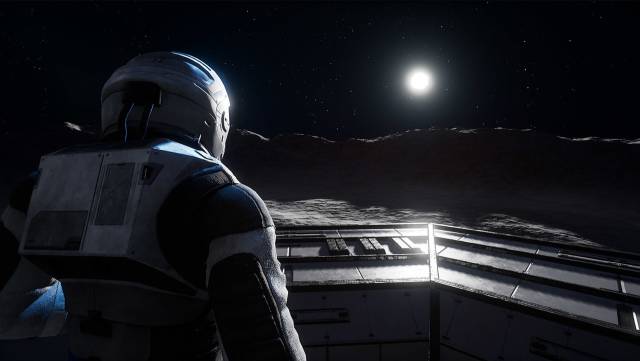
Together they compose an effective and delicious story for lovers of Space, Astronautics and Sci Fi works on the future of Humanity – if you are looking for ship duels or slimy xenomorphs, you will not find them here.
Narrative Puzzle
With a duration that ranges between 4 – 7 hours, depending on whether you want to simply melt it or prefer to explore it thoroughly, the game asks, pray the latter. Because collectibles are not a mere secondary element to artificially lengthen the duration of playing, as happens many times, but in this case they are all inseparable from the plot, and the more you find, the more you will know of the tapestry of characters, stories and revelations that are happening. , in such a way that already in the last level you have 90% of the story tied.
And you have it because you have discovered it, since the cinematics – made based on the original concept of holograms – give you the general brushstrokes, but many of the motivations and backgrounds of the characters do not. Many of the audios, holograms and elements that you must scan are not difficult to find – most of the time they come out to meet you – but you can undoubtedly pass some of them, causing the ending to be a little incomplete due to two audio notes that are decrypted precisely as we discover more collectibles.
Astronaut Simulator
But it seems that Deliver us the Moon is a ‘walking simulator’, and nothing further. This is a game, not a playable experience, and the good thing is that it is very varied, and you will not always be doing the same. There are phases in zero gravity by a silent space station; there are times to pilot vehicles on the lunar surface; of surviving spacewalks that you laugh at the Sandra Bullock in Gravity -or Kirk and Khan in Star Trek into Darkness-; platforms and even shooting. Kudos to some moments of tension that seem directed by the Cuarón of Gravity.
Some are very well implemented, such as jumping in zero gravity or driving on the Moon – an absolute pleasure -, others like the trigger element can be done uphill by the way of mapping them on the controller. The mechanic you will use the most is to explore and solve puzzles, but on the other hand, the difficulty of the tests is minimal, and they are solved quickly. What we did not like are the 2-3 unexpected peaks of difficulty, more for needing a gameplay adjustment than for the test itself, and that cause the momentum to be lost and in a specific case all the tension and spectacularity of the scene.
The map in your head
It may seem that the stages are small, but it should not be forgotten that in real space stations there is not exactly much physical space in which to move. One of the things that we liked the most is the absence of the classic map as such. With the hub you have on your wrist, the usual thing would have been to carry a map on it that would become visible as we explored.
But no, here you have the map in your head. It is true that in each room you see panels with the map of the level you are in so as not to miss too much, but they do not tell you more that you are in this or that area. The exploration is done by your own eyes, and when you are on the surface of the Moon it is more complicated.
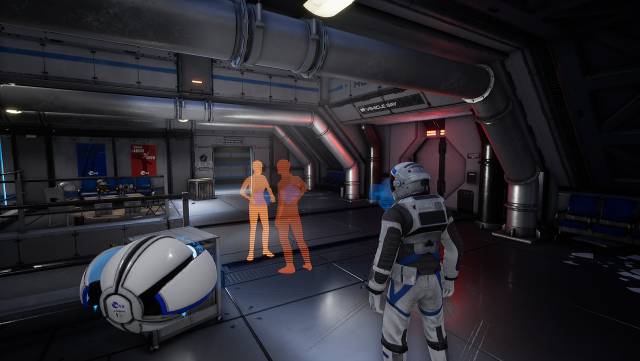
And is that this is one of those games that do not require haste, but pause. Delivering the tempo closer to 2001 than to Star Trek (2009), Deliver us the Moon plays on point with the trick provided by the spatial element, that is: heavy suits, slow movement -although the character can run and sometimes must- , zero gravity zones, etc. Contemplation is one of its pillars, and DUtM gives us playable hypnotic contemplative moments, with the cold beauty of space, of aseptic and white surroundings, or of the tremendous solar brightness on the surface of the Moon.
Outward
Using the Unreal graphics engine, at a graphic level don't ask it to be a Battlefront or a Mass Effect Andromeda – it just helps. But although its textures are simple and its effects grating indie, the set and the artistic direction make you fully immerse yourself and not realize it. In fact, the number of visually huge moments is very high, and parts like the first lunar walk are hypnotic.
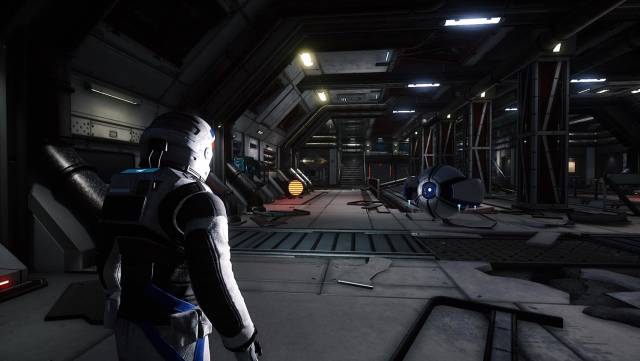
By contrast, the animations of the character seem a little fluid-leaning on the excuse of wearing a heavy spacesuit-there are times when restarting a checkpoint that the textures take time to load, and at least on PS4 it jerks and stops for a few seconds when it saves automatically.
There is one detail that we usually see for example in Disney movies: headlines, posters, photos and press clippings seen on stage come out in Spanish, although if there is more text -the body of a news story or a note written behind it- you will see in English. Of course, all texts are located in Spanish.
The sound of Space
The voices are in three languages: English, German or French, but subtitled in Spanish. And although some will be annoyed by that, stay with the fact that the original English dub is excellent, with actors who convey the complexity of the moments and feelings that their characters live.
Kudos to realism, because when we are either floating in Space or on the lunar surface, nothing is heard at the level of sound effects, simply quasi-ambient and muted music. And speaking of the BSO, the composition of Sander van Zanten is beautiful, sad, melancholic and hopeful. Without hardly increasing their intensity, Zanten goes through all different styles and manages to transmit the oppressive feeling of loneliness, hopelessness, new hope. A magnificent composition to hear separately, and which undoubtedly has Hans Zimmer's Interstellar or Max Richter's Ad Astra as references.
CONCLUSION
Although with bugs and elements to fix and improve, the truth is that the Deliver us the Moon trip can be very rewarding if you let yourself get caught. It is like living a small and effective spatial history about the human being, his future and what space beyond the Moon offers us. And as an astronaut simulator, of course the game has moments when it is a real gift for fans of the Apollo program, the films mentioned or Space in general.
THE BEST
- The gigantic (and sometimes oppressive) feeling of loneliness, constant from minute 1 of the game
- Audio collectibles and holograms, unveil what happened
- The first time you go to the lunar surface, a hypnotic moment thanks to the lighting and the sound mix
- Great simulator of what it is to be an astronaut, the playable variety
- All the sound section, from the voices to the BSO
WORST
- The jerks that the game hits suddenly when you get to a checkpoint and it starts to save, causes you to be caught for a moment.
- An imbalance in the difficulty curve with unexpected spikes that cause us to have to start several tests over and over again, which in case of some really spectacular written moments causes all the emotion and momentum to be lost
- The loading times, long, and some other scenario bug that if you catch it forces you to restart the checkpoint.
- Some mechanics like shooting need a review and be better integrated and mapped
Good
It meets the expectations of what is a good game, it has quality and does not have serious flaws, although it lacks elements that could have taken it to higher levels.
